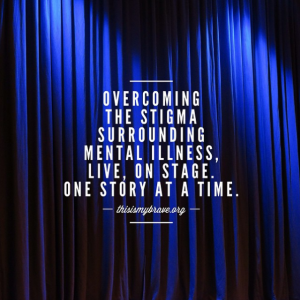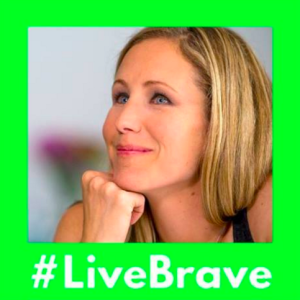On relating to Kristen Bell's mental illness disclosure
Last week Kristen Bell became the latest Hollywood star to mention that she's not ashamed for taking medication for her anxiety and depression, and the news of her mental illness disclosure went viral. I'm grateful she used her fame to bring awareness to an issue that touches so many of us, but at the same time felt like I couldn't quite relate, even though I've been affected by the same disorders. Listen, I'm all for celebrities sharing their stories. They have platforms much, MUCH, bigger than mine, and the more people who open up, the better. The more attention we can draw to the cause, the better. The more we normalize mental illness, the better.
[embed]https://youtu.be/mYUQ_nlZgWE[/embed]
I guess I just can't really relate to a celebrity. I've never met one myself, although I'd imagine most of them are down to earth. They are human, too, after all. Albeit humans with seemingly endless streams of money, and access to practically any doctor they would ever need to see. They experience mental illness the same way the rest of the population does, only with privilege. Many of them receive the proper diagnosis, effective treatment, and manage their conditions successfully.
On the flip side, no matter how much wealth and access to care they have, some we lose to suicide, like Robin Williams.
Now let me back up for a moment and acknowledge the fact that when I experienced my most serious battles with my mental illness, it was partially my privilege which allowed me to be able to get well. I recognize this.
What I'm trying to say is that to me, when a celebrity goes on camera and talks about having gone through a mental health issue, it's not nearly as impactful as when regular people I meet through my advocacy work share their stories. It's also not the same as a celebrity figure who has made a commitment to fighting the stigma surrounding mental illness by continually sharing her story - the way Demi Lovato has. There's a big difference between mentioning the fact that you take medication for anxiety and depression, and making it part of your purpose in life to educate people.
Also, last time I checked Psychologists weren't licensed to prescribe medication.
When I started this blog my goal was to simply inspire one person not to give up. To let her know that there is life after a mental illness diagnosis and multiple psychiatric hospitalizations. That the months spent crying and sleeping and barely eating because you're so nauseous even the thought of toast turns your stomach, that all those months and maybe even years spent suffering could come to an end.
I truly believe finding other people's stories online helped me to find my recovery path. Which is why when I found the right time to begin writing out my own story, I went for it. I knew that being anonymous wasn't the answer. But at the time I felt a responsibility to my family when making the decision on whether or not to use my real name in my writing. My disclosure would affect them, too, after all.
Then, after eighteen months of blogging, I reached a point where my anonymous writing had reeled in a regular paid blogging gig for WhatToExpect.com, and I wasn't willing to go on without receiving recognition for my work. I wanted to do my part to stand up to stigma, and I knew the best way to do that was come out of the closet about my mental illness. So I did.
And none of my fears came true. The fear of losing friends, of being discriminated upon, of being looked down upon. None. Instead, the response was the complete opposite.
Which is why I am such a strong believer in the power of storytelling. Yes, I come from privilege. But in our This Is My Brave shows there are plenty of people who have come forward to share their stories and they didn't have the same access to care that I did. They still made it out of the darkness. Their stories are extraordinary.
The power behind sharing our stories lies in the ability to comfort others. In our country alone, one in five adults is living with a diagnosable mental illness. We are all affected by it, whether we realize this or not. Mental illness is mostly invisible, and because of both internal and external stigma, and the fear it instills in people, those suffering often times do not reach out for help. They feel isolated, like they are the only one who has ever dealt with that condition.
It's not true. When we share our stories openly, people suffering in silence realize they are not alone. And they see that if someone like them was able to get well, they can too.
Which brings me back to my point about celebrities. Celebrities are people just like you and me. They're human. But given the world they live in, my guess is that it's hard for an average American to relate to their stories.
I urge you to visit our This Is My Brave YouTube Channel where you can view over 100 true, personal stories of overcoming mental illness from regular, everyday people. Teachers, students, small business owners, stay-at-home-moms, community service workers, and the list goes on.

This month, for Mental Health Awareness Month, we have five all-new This Is My Brave shows on the schedule. Our Greenville, South Carolina show was this past Thursday night and it was incredible. Our Iowa City show is this coming Friday night, the third annual DC-area show is this Sunday. And finishing out the month on the same date, May 19th, are our Chicagoland and Denver shows. All our new shows will be added to our YouTube channel this summer.
Deciding to share your own struggle with mental illness is a personal choice. It's This Is My Brave's goal to inspire people to #LiveBrave which means when you're ready, and you find the right opportunity to share your experience with someone, whether privately or publicly, you will. Your ability to be brave will give the other person the comfort and solace they need to feel understood. We've seen it happen through our guest bloggers and our live show presentations. It's life-changing and extremely powerful.
Whether you get that feeling from a celebrity talking about her experience, or someone you know and love in your life, the point is that together we can dissolve the stigma surrounding mental illness by sharing our stories.
 If you decide to #LiveBrave with us, we've designed an overlay you can add to your Facebook profile pic and Twitter profile pic. It's easy, simply follow the instructions here: http://twibbon.com/support/live-brave
If you decide to #LiveBrave with us, we've designed an overlay you can add to your Facebook profile pic and Twitter profile pic. It's easy, simply follow the instructions here: http://twibbon.com/support/live-brave